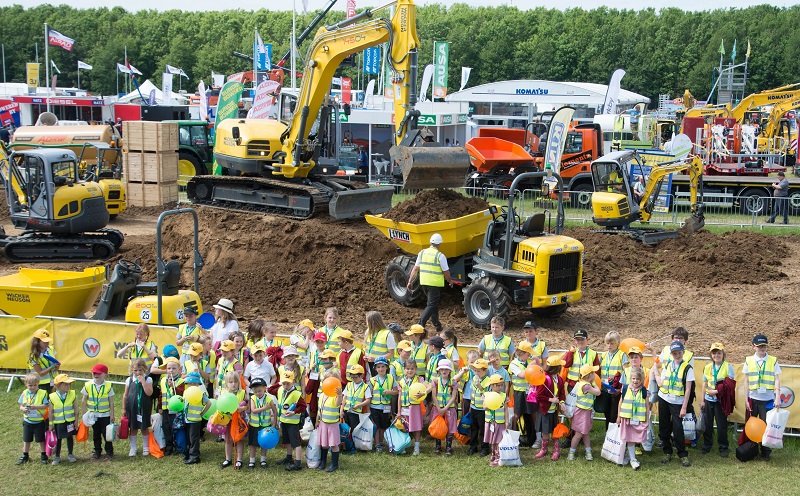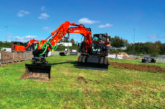
The CEA (Construction Equipment Association) and Plantworx Construction Equipment Exhibition has teamed up with educational organisation, Primary Engineer, to work with more than 25 primary and secondary schools in the Leicestershire area on an exciting STEM vehicle engineering project.
This new initiative by the CEA forms part of the CEA Skills Council programme – inspiring our future engineers today!
Engineering Skills and the Potential Impact on the UK Economy.
There is a well-documented drive to increase the number of young people engaging with STEM as a precursor to careers in the sector.
Within this ambition is the awareness that the number of females attracted to engineering and science is not increasing sufficiently to make an impact on the gender balance in the sector which wavers only slightly between 6 and 8.7%.
Primary Engineer will provide teacher training to both local primary and secondary schools – Primary Engineer vehicles projects for key stage 1 and key stage 2 and Secondary Engineer Fluid Power Challenge for key stage 3 at secondary schools.
The training comprises two teachers per school and an invited engineer. Teachers make models on the course to use in the classroom.
They are given an understanding of the curriculum links and access to the Primary Engineer Virtual Learning Environment where teaching resources can be found.
The demand for engineers’ way surpasses the numbers coming through the current routes to apprenticeships and university programmes.
Engineering UK’s Annual Report considers that over the period 2012-22 ‘employers will need to recruit 2.56 million people, 257,000 of whom for new vacancies.
Overall 1.82 million of these workers will need engineering skills: pro rata, that is an average of 182,000 people per year – yet current figures show only 26,000 people are entering engineering occupations. The scale of the challenge is clear.
Perceptions of engineering stereotypes are ripe for change and this will initiate in primary school classrooms. The attitude toward engineering as a profession by teachers, both primary and secondary is fundamental to how it is portrayed to young people.
The teaching of practical maths and science at an age when curiosity is at its highest, and practical working at its most impactful.
This will be reflected in pupil’s broader career horizons and aspirations – there is significant value in exploring careers awareness in primary schools.
Engineering is not often seen as a creative industry or one with a social conscience, yet many engineers provide solutions to humanitarian issues impacting on areas such as health, energy and transport.
It is generally acknowledged that engineers have the most sought after skill set of any profession and as such are highly in demand in all sectors.
It is this set of transferable skills which are also invaluable in classroom for both pupils and teachers.
To attain these skill sets requires engagement with problem solving, applying maths and science to practical activities.
Where these skills meet the wider world of engineering the skills find context and meaning it is this combination the Primary Engineer programme addresses.
Primary Engineer and The Universe of Engineering
Primary Engineer has been working with teachers to address the fundamental issue of a lack of engineers and the wider perception of engineering since 2005.
It is a not-for-profit organisation instigated through seed-corn funding from the then Department of Trade and Industry.
It has grown over the last decade to deliver teacher training to over 1000 teachers annually, bringing the programme, in the classroom, to over 33,000 new pupils, establishing itself as part of the curriculum in thousands of schools across the UK.
The research demonstrates that primary teachers find STEM subjects more difficult to teach, this lack of skills increases the disengagement of pupils with these subjects from a very early age.
Primary Engineer has addressed this issue by providing teachers with practical skills and academic knowledge to subtly apply and embed the theoretical into the practical, effectively ‘STEM by Stealth’.
The impact on the teaching professionals and their pupils which has been reported anecdotally in numerous schools, Ofsted reports and evaluations from Engineering UK’s Tomorrows’ Engineers programme which funded some of Primary Engineers engagement with schools have also demonstrated significant impact on learning outcomes and experiences.
Over the last decade Primary Engineer has responded to the demand led by teachers and local companies expanding the programme from the first Primary Engineer training days delivered to primary teachers to a comprehensive suite of training and whole class activities.
The primary school pupils will be set an engineering challenge to construct a vehicle whilst the secondary school pupils will design a crane using basic hydraulics.
Working in teams, the students will build their projects, which will form part of the school curriculum. The best teams will then present their designs at Plantworx on Thursday 8th of June as part of the Student Day where they will be judged by a team of engineers.
The winning teams will then go on to compete in the Primary Engineer National Finals.








